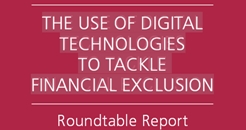 The use of digital technologies to tackle financial exclusion
The use of digital technologies to tackle financial exclusion
The Centre for Social Justice (CSJ) hosted a roundtable discussion in July 2016 to discuss how digital skills and technology can help tackle the problem of financial exclusion. The roundtable was attended by key personnel from Government, financial services and the third sector. Here are some extracts from their report:
A 2011 Government report estimated that 9 million people across the UK remain underserved by mainstream retail banking services. 1.54 million of this group ‘do not have a transactional current account’. Over a third of ‘unbanked households’ are in the bottom income quintile, where the majority of income is via benefit payments.
Such ‘financial exclusion’ is a hallmark symptom of low income, welfare dependency, and poverty. Financially excluded individuals and households are more likely to have low levels of financial literacy, and remain vulnerable to loan sharks, payday lenders, and incurring crippling debt.
New digital technologies are increasingly being used to tackle financial exclusion. These include the use of pre-paid cards, budgeting apps and simplified current accounts designed for lower income and less financially stable households. The Government has also looked at how digitisation of public services can reduce financial exclusion.
New technology is an obvious solution to the problem of financial exclusion. Yet there is a problem: this solution is only available to those who possess the digital skills required to access it. The increasing number of both banking and welfare services that can only be accessed online via a computer has exposed the problem of low digital skills attainment. New evidence suggests the UK is facing a digital skills crisis, with 12.6 million people reported to have poor digital skills and 5.8 million people reported not to have ever used the internet.
Problems seen were:
-
A lack of trust, capability, and capacity prevent individuals from engaging with technology that prevents financial exclusion.
-
Some groups lack the technological skills to access online financial services.
-
Some financial services are prohibitive due to the cost of access.
-
KYC (Know Your Customer) regulations in financial services legislation often inhibit the work of financial services companies reaching potential customers.
-
The variety of financial services available to individuals can be overwhelming and off-putting.
-
Financial exclusion is not a high enough priority within central government.
-
Financial exclusion is not well-defined and not well measured.
Several policy recommendations emerged from the roundtable that will help to achieve an end to financial exclusion.
Read the report here.
The policy recommendations require acceptance and action from government (local and national) and/or financial services companies. This could obviously take a long time.
In the meantime, well done to all those churches who are running social actions enhancing job skills (which frequently address digital literacy)!
Also please look at a previous blog looking at some financial products that could be useful for those struggling with budgeting and managing their finances.
If you work in financial services, what can you do to better serve this large group of people?
Retweet about this article
From a report by CSJ, 23/01/2017